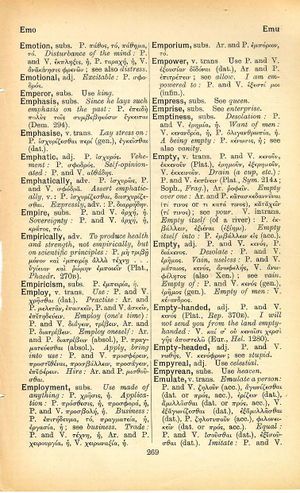emphasis: Difference between revisions
From LSJ
έγ', ὦ ταλαίπωρ', αὐτὸς ὧν χρείᾳ πάρει. τὰ πολλὰ γάρ τοι ῥήματ' ἢ τέρψαντά τι, ἢ δυσχεράναντ', ἢ κατοικτίσαντά πως, παρέσχε φωνὴν τοῖς ἀφωνήτοις τινά → Wretched brother, tell him what you need. A multitude of words can be pleasurable, burdensome, or they can arouse pity somehow — they give a kind of voice to the voiceless | Tell him yourself, poor brother, what it is you need! For abundance of words, bringing delight or being full of annoyance or pity, can sometimes lend a voice to those who are speechless.
(Woodhouse 3) |
(CSV4) |
||
| Line 1: | Line 1: | ||
{{ | {{Woodhouse1 | ||
| | |Text=[[File:woodhouse_269.jpg|thumb|link={{filepath:woodhouse_269.jpg}}]]'''subs.''' | ||
<b class="b2">Since he lays such emphasis on the past</b>: P. ἐπειδὴ πολὺς τοῖς συμβεβηκόσιν ἔγκειται (Dem. 294). | |||
}} | }} | ||

